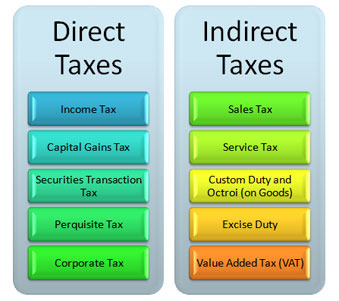Taxes are implemented by the administrations on their residents, it is an automatic charge imposed on companies or people by an administration element, regardless of whether national, provincial or neighborhood so as to back government exercises with funds.
Taxes are a money related weight laid upon people or land owners to loan their help to the administration. The taxes are not a deliberate installment rather they are an upheld commitment towards the administration.
Taxes gathered are used by the administration for different costs, for example, safeguard, medicinal services, training and distinctive foundation offices, for example, streets, dams, thruways, etc.

The Two types of taxes:
Fundamentally, there are two types of taxes to be specific Direct and Indirect taxes. Indirect taxes really can move the weight to the end taxpayer. Direct taxes, then again, enable the administration to gather the taxes directly from the purchasers. Indirect taxes enable the legislature to get steady and guaranteed returns by means of the general public.
Distinction between Direct Tax and Indirect Tax:
There are various ramifications of direct and indirect taxes on the nation. Notwithstanding, the two kinds of taxes are significant for the legislature as taxes incorporate the significant piece of income for the administration.
Key contrasts among Direct and Indirect Tax are:
A direct tax is demanded and paid by the people, firms, Hindu Undivided Families (HUF), organizations and so forth though the indirect tax is at long last paid for by the end-customer of products and enterprises.
If there should be an occurrence of direct taxes, the weight of tax can't be moved while weight can be moved the extent that the indirect taxes are concerned.
Tax avoidance is conceivable in the assortment of direct taxes while tax avoidance is beyond the realm of imagination to the extent the indirect taxes are worried as the taxes are charged on products and enterprises.
A direct tax is instrumental in decreasing expansion, while indirect tax may build swelling
Direct taxes have better allocative impacts when contrasted and indirect taxes as direct taxes put a lot lesser weight over the assortment of indirect taxes. This is the place the assortment is dispersed over the different gatherings and purchasers' inclinations of merchandise are mutilated on account of the value varieties in light of indirect taxes.
Direct taxes helps in diminishing disparities and are undeniably more dynamic than indirect taxes which improve imbalances and are thus viewed as backward.
Indirect taxes include far lesser managerial costs inferable from the steady and advantageous assortments, while direct taxes incorporate various exclusions and furthermore bring about higher regulatory expenses.
Indirect taxes are veer towards development and progress as they debilitate utilization and help increment reserve funds. Direct taxes, then again, lessen reserve funds and furthermore demoralize ventures.
Indirect taxes have a bigger inclusion as various individuals from the general public are taxed on the closeout of merchandise and enterprises, while direct taxes are gathered uniquely from explicit individuals in separate tax sections.
Extra indirect taxes are imposed on adverse to-wellbeing wares, for example, cigarettes, liquor, etc. This deters over-utilization and consequently helps the nation in a social setting.
Both the direct and indirect taxes are significant for the nation as they sway the general economy. Direct tax incorporates personal tax, riches tax, partnership tax and so on. Indirect taxes, then again, are applied to the deal and production of merchandise and ventures. Both direct taxes and indirect taxes are gathered by the focal and individual state governments and it relies upon the sort of taxes to be required.








